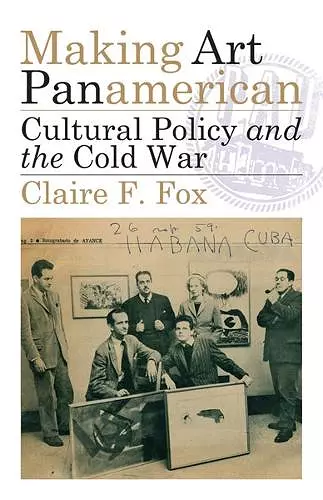Making Art Panamerican
Cultural Policy and the Cold War
Format:Paperback
Publisher:University of Minnesota Press
Published:26th Feb '13
Currently unavailable, and unfortunately no date known when it will be back

Among the buildings on the National Mall in Washington, D.C., only the Pan American Union (PAU) houses an international organization. The first of many anticipated “peace palaces”constructed in the early twentieth century, the PAU began with a mission of cultural diplomacy, and after World War II its Visual Arts Section became a leader in the burgeoning hemispheric arts scene, proclaiming Latin America’s entrée into the international community as it forged connections between a growing base of middle-class art consumers on one hand and concepts of supranational citizenship and political and economic liberalism on the other.
Making Art Panamerican situates the ambitious visual arts programs of the PAU within the broader context of hemispheric cultural relations during the cold war. Focusing on the institutional interactions among aesthetic movements, cultural policy, and viewing publics, Claire F. Fox contends that in the postwar years, the PAU Visual Arts Section emerged as a major transfer point of hemispheric American modernist movements and played an important role in the consolidation of Latin American art as a continental object of study.
As it traces the careers of individual cultural policymakers and artists who intersected with the PAU in the two postwar decades—such as Concha Romero James, Charles Seeger, José Gómez Sicre, José Luis Cuevas, and Rafael Squirru—the book also charts the trajectories and displacements of sectors of the U.S. and Latin American intellectual left during a tumultuous interval that spans the Mexican Revolution, the Spanish Civil War, the New Deal, and the early cold war. Challenging the U.S. bias of conventional narratives about Panamericanism and the postwar shift in critical values from realism to abstraction, Making Art Panamerican illuminates the institutional dynamics that helped shape aesthetic movements in the critical decades following World War II.
"Making Art Panamerican brings understandings of cultural policy into conversation with many other areas of concern, and therefore greatly expands the sense of that policy sector’s relevance to political, economic and broadly social frameworks. This allows for an invigorated sense of why and how cultural policy matters, and is reflective of the complexity of the space in which it takes place. It is brimming with strongly argued points and clearly articulated insights." —Rachel Weiss, author of To and from Utopia in the New Cuban Art
- Runner-up for Making Art Panamerican 2014
ISBN: 9780816679348
Dimensions: 216mm x 140mm x 51mm
Weight: unknown
352 pages